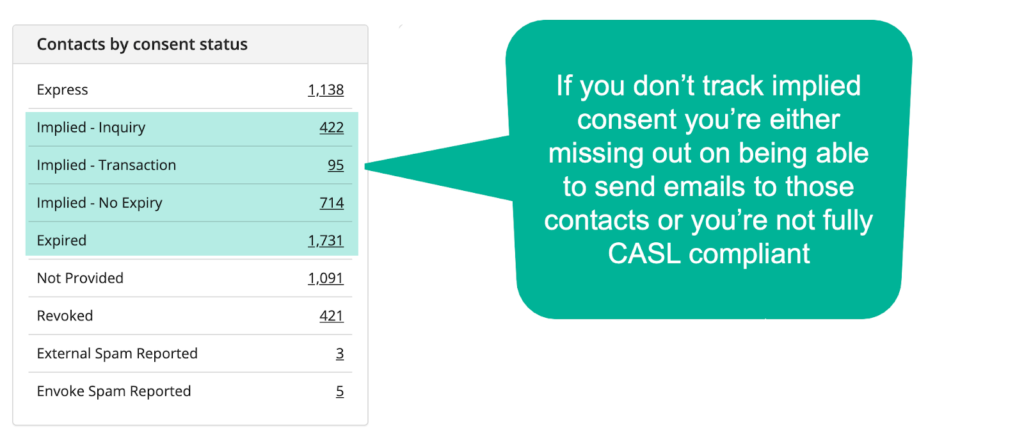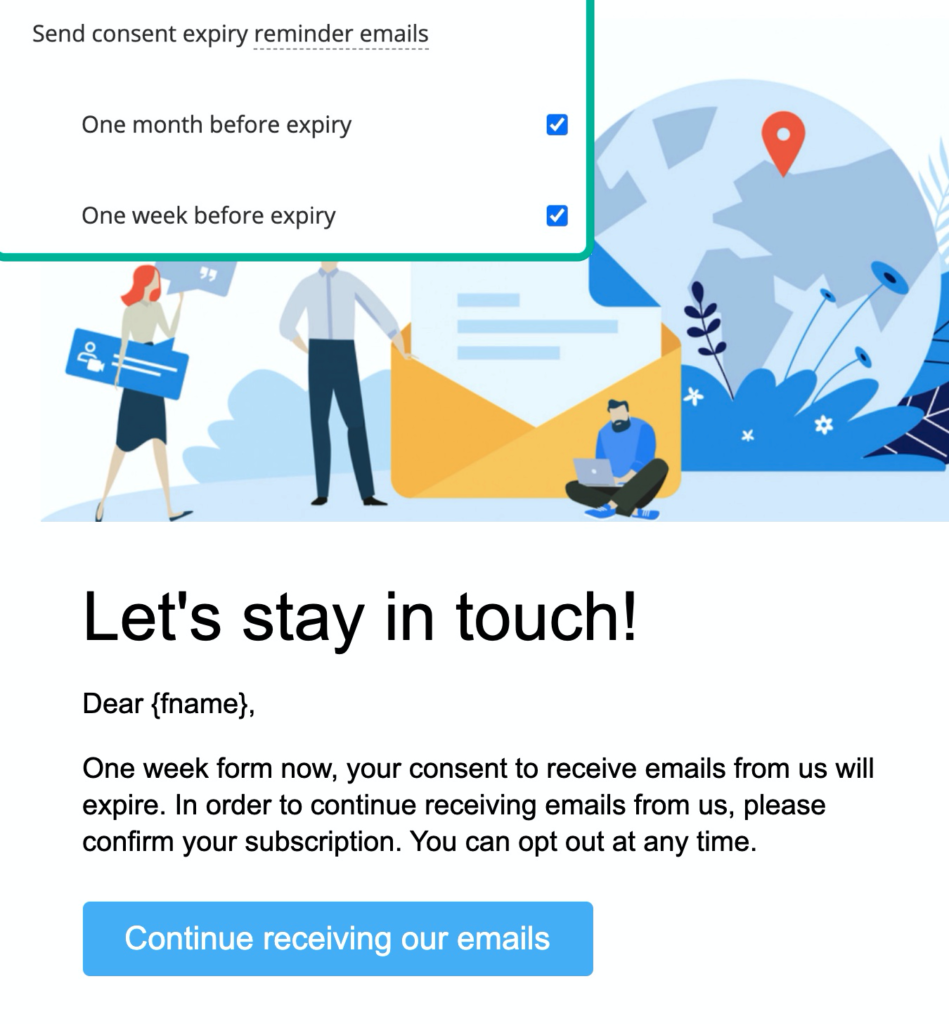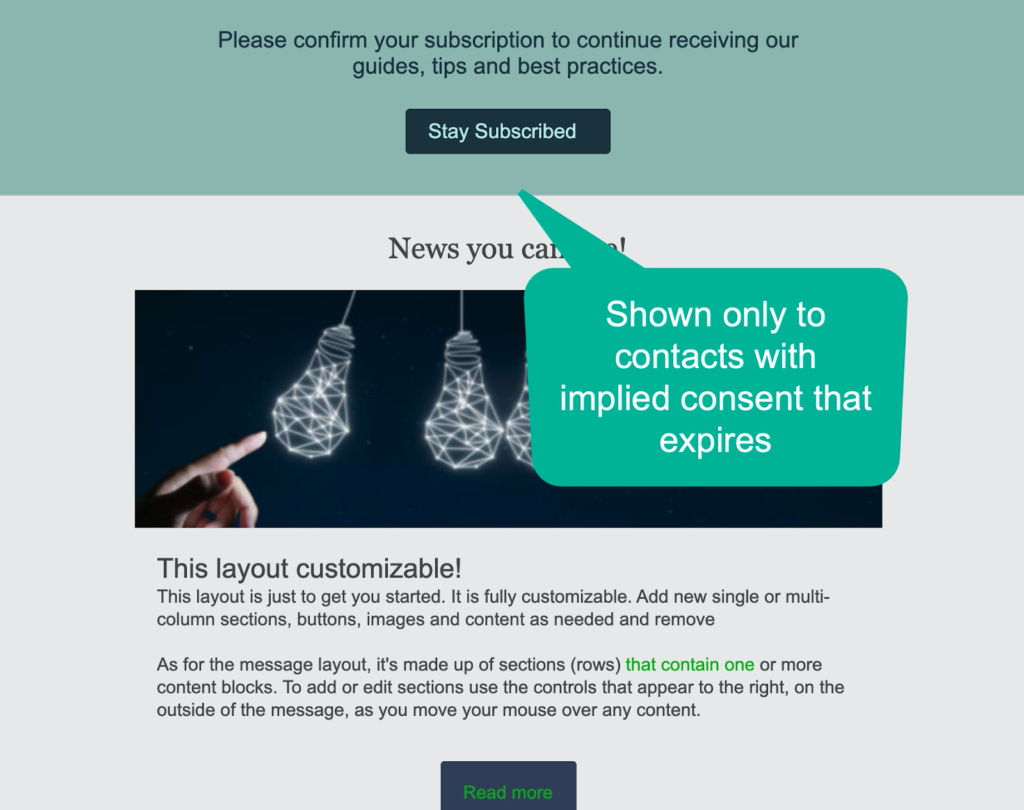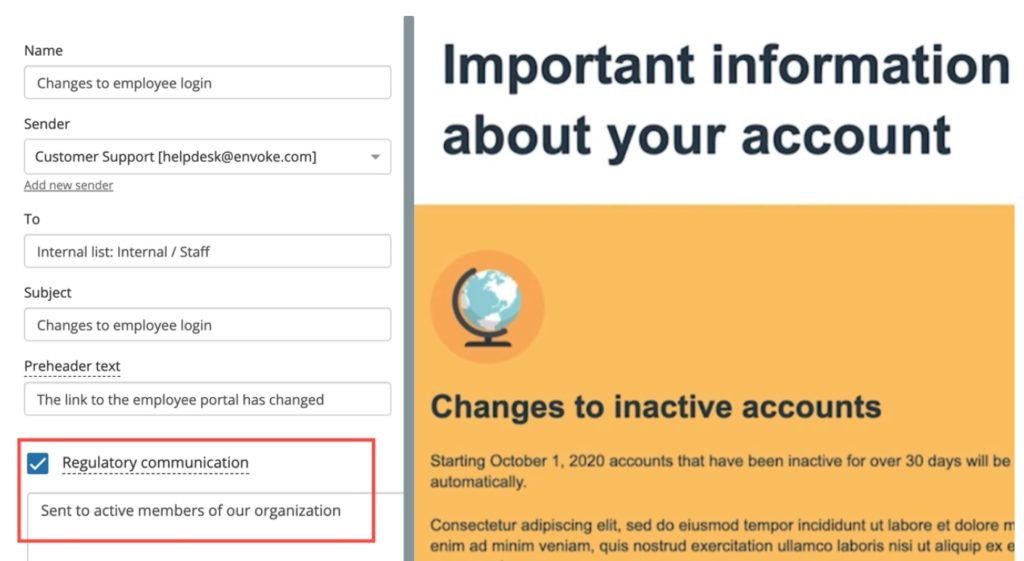Let’s review why Canadian companies should use CASL compliant email marketing software.
If you are a Canadian company and don’t use a Canadian email marketing software then you’re either not fully CASL compliant or you’re not reaching many contacts you can potentially send emails to.
Two of the most common objectives of Canadian email marketers and communication specialists are to:
- Reach as many contacts with their email content as possible
- Do so in a way that is compliant with CASL and other regulations
Unless you use a Canadian email marketing company there is a very good chance you could do much better for both of these points because Canadian email marketing requires unique compliance with CASL. CASL in turn prescribes the use of implied consent statuses in addition to the standard opt-in (express consent) status that every email marketing software supports.
In this article we’ll address the following topics:
- Is Mailchimp CASL compliant?
- Which email marketing companies provide adequate CASL functionality and store data in Canada?
- CASL functionality comparison of Canadian email marketing companies
- What is implied consent and how it allows you to reach more contacts
- Using implied consent without automation is a nightmare
- Send consent reminder emails
- Solicit express consent automatically each time you send an email
- Send regulatory emails even to unsubscribed contacts
Is Mailchimp CASL compliant?
Rudimentary CASL compliant email marketing can be achieved quickly and easily: Ensure everyone on your list has opted in and provide an easy way for contacts to opt out. This is the approach taken by the majority of email marketing platforms. They claim their software is CASL compliant and they are right. And while this subscribed / unsubscribed approach works for many small businesses it’s an inadequate implementation that doesn’t maximize the list of emailable contacts and doesn’t accommodate exceptions and nuances under CASL.
Take Mailchimp for example. They are the 800 pound gorilla used as a benchmark for email marketing software excellence. Are they CASL compliant? Sort of. Do they support implied consent, consent expiry reminders, sending of regulatory emails and a myriad of other CASL related features? No they don’t. They don’t have to. Their target market isn’t interested in that much CASL detail. All is well as long as contacts can subscribe and unsubscribe. And this is true not just for Mailchimp but for many of the email marketing heavyweights such as Constant Contact, Campaign Monitor, AWeber, etc.
In essence Mailchimp is not CASL compliant unless you define CASL compliance merely as tracking subscription status and allowing for a self-serve opt-out mechanism.
Not to mention that the largest email marketing companies are based in the US and don’t store data in Canada in the first place, which is a requirement that often goes hand in hand with CASL compliance for Canadian organizations. Even if data storage in Canada isn’t a requirement for your company you should at least be aware that the Patriot Act in the US allows the US government to access your data.
Which email marketing companies provide adequate CASL functionality and store data in Canada?
It boils down to three companies to choose from. Their pricing is similar but functionality is vastly different:
Campaigner stores data in Canada but has very poor CASL support.
Cyberimpact also stores data in Canada and has much better CASL related functionality.
Envoke also stores data in Canada and includes sophisticated CASL compliance and automatio features.
Are there really only three companies to choose from? In fact there are a few other email providers with data in Canada but after you open a trial account you’ll quickly see that they aren’t strong contenders based on our research. The functionality gap is simply too large to begin with.
We’ve created a comparison table of key compliance features to illustrate the differences:
Functionality comparison among CASL compliant email marketing software
| Feature | Non-Canadian email platforms Mailchimp, Campaign Monitor, Constant Contact, etc. |
Envoke | Cyberimpact | Campaigner |
|---|
What is implied consent and how it allows you to reach more contacts
When you can only send emails to contacts who have explicitly opted-in to your list – this is called express consent in CASL lingo – you’re missing out on reaching contacts that you can send emails to as per CASL rules even though they didn’t explicitly opt-in to your list. These contacts provided you with their implied consent.
Implied consent is when a contact didn’t explicitly opt in to receive emails from you, instead they made an inquiry or a purchase or they could be members of an association, alumni group, a client of yours, an employee or a partner, etc.
You can send emails to all of these contacts either with or without a time limit.
If your email program doesn’t support tracking implied consent you are forced to mark these contacts as opt-in/express consent, which isn’t true and with that you’re no longer CASL compliant.

Using implied consent without automation is a nightmare
Tracking implied consent is a great first step. But the consent you have from most contacts with implied consent will eventually expire (certain implied consent types don’t expire) and to remain CASL compliant you can’t email them anymore. At this point you have three choices:
- Reluctantly let them expire and don’t email them anymore. Your list is shrinking.
- Keep emailing them even though you know that you are no longer in compliance with CASL regulations. You risk potential fines.
- Try to convert them to provide express consent. Express consent doesn’t expire.
Of course you want to go for the last option. Remain compliant and keep emailing your list. But how do you get contacts to provide express consent?
Don’t let implied consent expire
Contacts whose implied consent expired can’t be emailed as per CASL.
In order to comply, first you need to track the date consent was provided and the date of expiry for each individual contact. Then, everyone whose consent expires needs to be automatically removed from your list so you don’t end up (accidentally) sending them emails.
This manual management of rolling expiry dates is tedious and error prone, the kind of gruntwork nobody wants to do. Envoke manages this automatically and switches the consent status of expired contacts to “Expired” and automatically excludes them from future mailings.
You remain compliant and didn’t even have to lift a finger.

Send consent reminder emails
Contacts with implied consent don’t actually know that their consent will expire at some point. Many of these contacts want to continue to hear from you so your best bet is to send them reminders letting them know that in X days they will no longer get your emails. As you can imagine this also falls under the tedious and error prone category of unwanted gruntwork. Envoke has a built-in option that lets you automate the sending of consent expiry reminder emails a week and a month before expiry with fully customizable messages.

Solicit express consent automatically each time you send an email
You already send emails to your contacts at regular intervals. What if there was a way to ask for the coveted express consent in every email you send without bothering contacts who already provided you with their express consent. Envoke’s dynamic consent request banner does exactly this. A customizable block of text and a button are added to emails but only for contacts with implied consent. Automatic. Non intrusive. Dynamic. Effective.

Send regulatory emails even to unsubscribed contacts
What happens when stakeholders or employees unsubscribe from email updates but you need to send them an important message? What happens when students opt-out from marketing messages but you need to inform them of a schedule change or school closure? Or you want to send an email about a safety issue or emergency?
Most email platforms won’t let you send emails to unsubscribed contacts, period. This means that sending regulatory or mandatory messages is outright impossible.
Envoke’s regulatory message setting makes it possible to send emails to anyone – even to unsubscribed contacts. (This feature has the potential for abuse so it’s disabled by default and it’s only turned on after a manual review process.)

Conclusion
CASL is a uniquely Canadian legislation with one of the toughest and most complex anti-spam rules in the world. There are only a handful of email marketing providers that provide CASL compliance and even fewer that do it well.
If you care about compliance and care about reaching as many contacts with your emails as possible then you need a solution that truly understands CASL related pains and offers a solution to make your headache go away at a competitive price.
About Envoke
Established in 2007, Envoke is a Canadian owned and operated CASL compliant email software that simultaneously pleases your compliance officer, maximizes your emailable contact list and automates CASL compliance related tasks. All data is stored in Canada.
In addition to compliance settings there is rich functionality for email management, user access, forms, reporting and subaccounts to accommodate multiple departments.
You can open a fully supported trial account or get a demo if you want to dive even deeper and discuss your email communications situation with us.
See Envoke’s compliance features in action:
